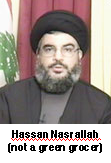
Ever since King Abdullah of Jordan, in a moment of Sunni paranoia, coined the phrase "the Shia crescent" to describe his perceived alliance of Iran, Syria, Hezbollah and Hamas, it has caught on as descriptive of what does indeed seem to be a growing force in the Middle East.
The Crescent is something less than Shia; nonetheless, it does make political sense. Syria and Hamas are both predominantly Sunni; however, Syria is run by the nominally Shia Alawites and Hamas is a friend of Shia Iran. To the original four, we might add Iraq which is now dominated by its 65 per cent Shia population.
So is this a good thing or a bad thing?
The Islamic world has been in the doldrums for a long time. It needs rejuvenation. If the Crescent can do that in a constructive way, it should be welcomed. There are good signs. Both Hamas and Hezbollah participate in the democratic process with considerable success, as have the Shia in Iraq. Even Iran has adopted some democratic elements, including election of the president. Only Syria remains mired in a sordid dictatorship. On the social justice front, both Hamas and Hezbollah effectively provide a range of social services, and seem to do so with little corruption. Indeed they serve as an example to Arab governments. As a result of these various measures, they both have broad popular support in the Arab and Islamic worlds, even among Sunnis.
On the other hand, is the Crescent too ideologically rigid to be a healthy participant in world affairs? Certainly, it is instructed by religion and that's troublesome. Nonetheless, we are not talking about al-Qaeda or Taliban type extremism here. The leader of Hezbollah, Hassan Nasrallah, accused the Taliban of turning Afghanistan into "a hideous example of an Islamic state." As for al-Qaeda, he referred to their beheading of Nicholas Berg as despicable and has condemned most of their other actions, particularly the bombing of the World Trade Center in New York.
It is true all the members of the Crescent are bitterly hostile toward Israel; however, as I explained in a previous post (Israel and the Right to Exist), this is a reasonable point of view from the Arab perspective and must be accepted as a starting point in negotiations for a stable Middle East. Furthermore, the Shia only make up 10 to 15 per cent of the world's Muslims, so they can only lead if the great majority of Muslims are prepared to follow.
A big question is how the United States and Britain react to this revival. If they give it a chance, even accept it and work with it, it could lead to the renaissance Islam desperately needs. Unfortunately, they tend to see anything they can't control as a threat and wind up interfering and generally mucking things up. If that happens this may be yet another lost promise for the Middle East like that of democracy in Iran in the 1950s, dashed by the unholy collaboration of the US, the UK and the Iranian army. We can only hope this time they will be part of the solution, not part of the problem, even if it means just minding their own damn business.
 Today, Ralph Klein spends his last day in Alberta's legislature. I have never been a fan of Ralph (as he is known by friend and foe here in Wild Rose Country), but he was mayor of my city for nine years and premier of my province for fourteen, so the least I can do is wish him well.
Today, Ralph Klein spends his last day in Alberta's legislature. I have never been a fan of Ralph (as he is known by friend and foe here in Wild Rose Country), but he was mayor of my city for nine years and premier of my province for fourteen, so the least I can do is wish him well.















